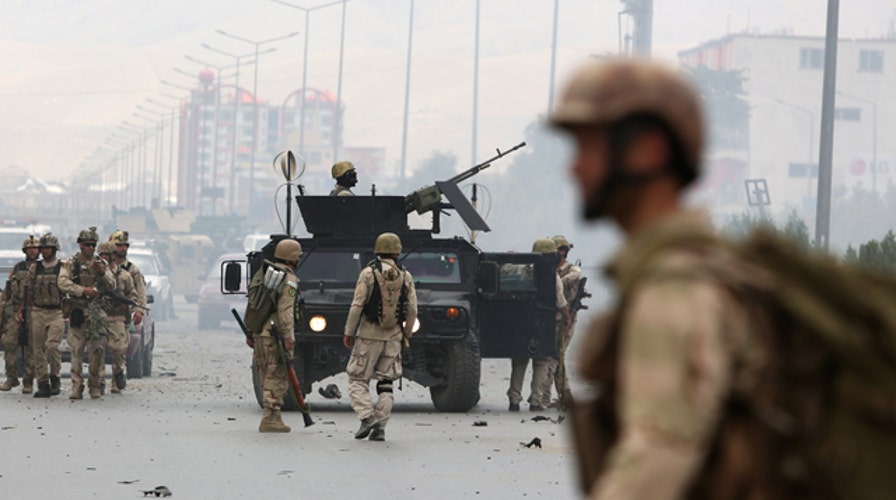Taliban, ISIS battle for influence in Afghanistan
John Hannah and Benjamin Collins on the region's terror threat
The Taliban attack on Afghanistan’s parliament Monday could be an indicator that the terror group is trying to prove to Afghan officials and other extremists they are the top jihadist movement in the country, foreign policy experts warn.
Fox News National Security Analyst KT McFarland spoke to John Hannah and Benjamin Collins about Afghanistan’s security situation.
Hannah, a senior counselor with the Foundation for Defense of Democracies, sees similarities in the attack to tactics used by ISIS in the Middle East.
“They are looking at a U.S. drawdown significantly. They think that they might be able to re-create what ISIS has done in Iraq,” he said. This attack “is very much the Taliban putting down their marker and they are on the offensive elsewhere in Afghanistan, picking up territory – the Taliban is back.”
Collins, a former Green Beret officer who served in Afghanistan, says the fight against the Taliban has been a “whac-a-mole war … as the U.S. or NATO and allied forces moved into one area they would scuttle into another.” Recently, he added, “now the Taliban has a much easier ability to rear its head, especially with loses that Afghan security forces have taken in the past year.”
Experts believe the Taliban’s recent uptick in attacks could be related to ISIS attempting to gain a foothold in the country.
“ISIS is a growing threat inside of Afghanistan. The only bright spot is the people that ISIS is attracting are disaffected Taliban – people who are looking for a slightly different or even radical cause,” said Hannah. He points to some “Taliban commanders quite worried about the rise of ISIS and the fracturing of the radical Islamist jihadist movement inside of Afghanistan and how it might affect their ability to take over once the US drawdown is complete … none of this is good news for America.”
In April, ISIS claimed responsibility for at least one attack which killed 35 people in a suicide bombing in eastern Afghanistan.
Even if ISIS carried out this attack, Collins downplays any significant role ISIS could play in Afghanistan long-term. “ISIS have shown that they have a universal goal versus a nationalistic ability of the Taliban.”
Though Afghan President Ashraf Ghani warned Congress earlier this year of the “terrible threat” from ISIS and that the terrorists are already “sending advance guards to southern and western Afghanistan to test for vulnerabilities."
Hannah believes ISIS won’t be able to attract a large number of foreign fighters to Afghanistan as compared to in Iraq and Syria. “We’ve always had foreign fighters in Afghanistan, a lot of them coming into Central Asia, but not nearly the kind of numbers we’ve seen being recruited in [the Middle East].”
The unraveling security situation has some fearing the country is regressing. “We’re heading into the pre-Taliban era of the '80s where some of the military efforts belong to the separate warlords. [They] are going to rise to power again." He added that if the current central government can’t bring stability then, “the reality is we are going to fall back to things the way they were 25, 30 years ago.”

